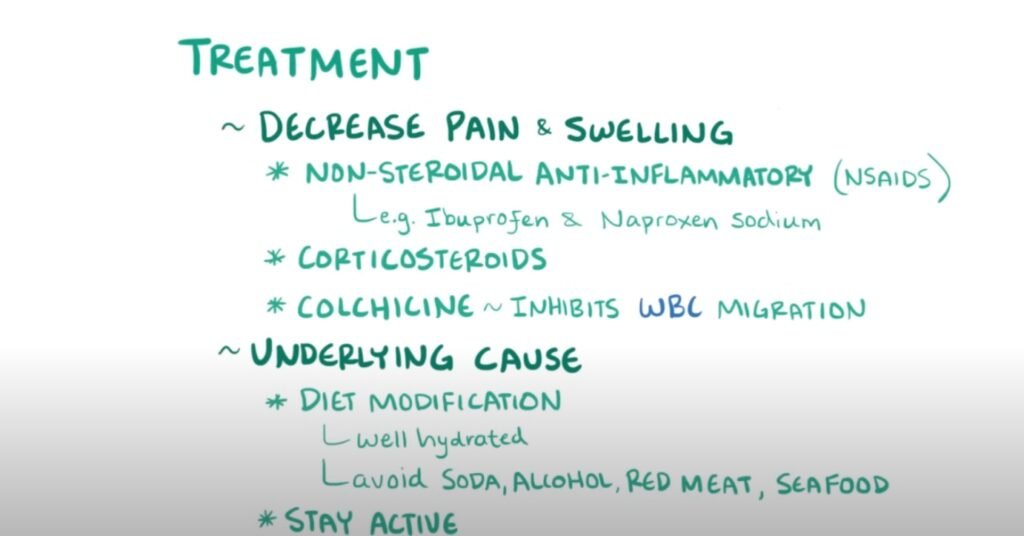Gout, a form of inflammation characterized by recurrent joint swellings, has long been associated with wealth and predominantly affects middle-aged men. However, women, especially after menopause, are also susceptible to this condition. Historical records from ancient Greece and Rome, dating back to 1663, document the recognition of gout by physicians, notably by Sydenham, who differentiated it from other joint disorders. During the 18th century, large, enjoyable meals and alcohol consumption were often precursors to gout attacks, afflicting notable figures in history like Alexander the Great, Martin Luther, and Isaac Newton.
Symptoms of Gout
Gout manifests through acute pain in joints, commonly the big toe, accompanied by tenderness, heat, and swelling within hours. Weight-bearing on the affected foot becomes nearly impossible during acute stages, with potential spread to other joints like knees and wrists. These attacks typically occur at midnight or early morning, lasting for about a week, sometimes accompanied by slight fever and loss of appetite. Without proper treatment, gout can lead to chronic conditions, characterized by uric acid crystal deposits in joints and under the skin, as well as complications like kidney stones and impaired kidney function.
Causes of Gout
The primary cause of gout is the formation of uric acid crystals in joints, skin, and kidneys. Elevated uric acid levels result from increased production or reduced excretion through urine, leading to crystal formation and subsequent gout attacks. Hereditary factors play a significant role, along with lifestyle choices such as excessive alcohol consumption, high-protein diets, and lack of exercise. Stress is also considered a contributing factor, as it can trigger the release of uric acid into tissues.

Management and Remedies
- For an acute attack, there is no better remedy than a fau The patient should undertake a fast for five to seven day con orange juice and water. Sometimes the condition may worses in the early stages of fasting when uric acid, dissolved by juice, is thrown into the bloodstream for elimination. If the fast is maintained, this usually goes away. In severe cases, it is advisabie to undertake a series of short fasts for three days or so rathe than one long fast. A warm water enema should be used day during the period of fasting to cleanse the bowels.
- After the acute symptoms of gout have subsided, the patient may adopt an all-fruit diet for a further three or four days. He is to consume juicy fruits including grapes, apples, pears, peaches, oranges, and pineapple for three meals a day as part of this program. After the all-fruit diet, the patient may gradually embark upon the following diet:
- Breakfast: Fruits such as oranges, apples, figs, apricot, mangoes, whole wheat bread or dalia and milk or butter-milk.
- Linch: Steamed vegetables such as lettuce, beets, celery, water-cress, turnips, squash, carrots, tomatoes, cabbage and potatoes, chappatis of whole wheat flour, cottage cheese and butter-milk.
- Dinner: Sprouts such as alfalfa and mung beans, a good-sized salad of raw vegetables such as carrots, cabbage, tomatoes, whole wheat bread and butter.

- The patient should avoid all purine and uric acid producing foods such as all meats, eggs, and fish. Glandular meats are especially harmful. He should also avoid all intoxicating liquors, tea, coffee, sugar, white flour and its products, and all canned and processed foods. Spices and salts should be used as little as possible.The cherry; sweet or sour, is considered an effective remedy Argout. This was discovered by Ludwig W. Blan Ph. D. some 15 years aga Himself a gout sufferer, Blan found the use of derries to be miraculously effective in his own case and mblihed his own experience in a medical journal. Subsequently, many people with gout used this simple therapy with great To start with, the patient should consume about 15 i 25 cherries a day. Thereafter, abile fish chetes a are est. keep the ailment under control. While fresh cherries are best, cand cherries can also be used with success.
- Foods high in potassium such as potatoes, bananas, leafy green vegetables, beans and raw vegetable juices are protective sainst gout. Carrot juice, in combination with juices of beet and cucumber, is especially valuable. 100 ml. each of beet and number juices should be mixed in 300 ml. of carrot juice to make 500 ml. of combined juice. Another useful remedy for gout is the juice of string or French beans. The patient with this illness should consume about 150 milliliters of this juice. Fresh pineapple juice and raw potato juice provide additional health benefits.
- The feet should be bathed in Epsom salt foot baths twice daly. You can add between half and one pound of salt to a foot bath filled with hot water. Full Epsom salt baths should also be taken three times a week. The baths may be reduced to two per week later. Cold packs at night, applied to the affected pints, will be beneficial. Fresh air and outdoor exercise are also essential. The patient should eliminate as much stress from his life as possible.
- Effective management of gout involves lifestyle modifications and natural remedies. During acute attacks, fasting for five to seven days with orange juice and water can provide relief. Subsequent adherence to an all-fruit diet for a few days, followed by a balanced diet rich in fruits, vegetables, and whole grains, is recommended. Avoidance of purine-rich foods like meats, eggs, and fish, as well as alcohol, caffeine, and processed foods, is crucial. Cherries, known for their anti-inflammatory properties, can be beneficial, along with potassium-rich foods like bananas and potatoes. Additionally, foot baths with Epsom salt and cold packs can alleviate symptoms, while stress reduction through outdoor exercise and relaxation techniques is essential for long-term management.

Conclusion
Gout, though historically associated with the affluent, affects individuals from various demographics. Understanding its symptoms, causes, and management strategies is crucial for effectively dealing with this condition. By adopting healthy lifestyle choices and incorporating natural remedies, individuals can mitigate the impact of gout on their quality of life.

FAQs (Frequently Asked Questions)
- Is gout a preventable condition?
- While gout cannot always be prevented, adopting a healthy lifestyle, including maintaining a healthy weight, staying hydrated, and avoiding trigger foods, can help reduce the risk of gout attacks.
- Can gout be cured with dietary changes alone?
- While dietary changes can help manage gout symptoms, they may not be sufficient to cure the condition. Medications and lifestyle modifications are often necessary for long-term management.
- Are there any natural remedies for gout?
- Some natural remedies, such as cherries, ginger, and turmeric, may help alleviate gout symptoms. However, it’s essential to consult with a healthcare professional before trying any natural remedies.
- What are the long-term complications of untreated gout?
- Untreated or poorly managed gout can lead to various complications, including recurrent gout attacks, joint damage, kidney
